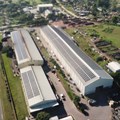
Why South Africa needs to innovate tyre recycling
While Asia, Europe, and Australia's tyre recycling capabilities include operational large-scale devulcanisation plants, South Africa's is mostly centred around shredding, crumb production, and energy recovery. Dr Mehran Zarrebini from the Mathe Group plans to change that as his company upgrades and expands its plant at Hammarsdale in KwaZulu-Natal.

Image credit: Goh Rhy Yan on Unsplash
Enhancing circular economy
Zarrebini, who is also the founder of the Tyre Recycling Industry Association of South Africa (Triasa), believes developing such plants could open up new markets for recycled rubber in manufacturing and construction and enhance our fledgling circular economy.
Thereby reducing dependency on virgin rubber imports but also addressing the ever-increasing stockpile of difficult-to-process off-the-road OTR tyres, which are an ever-present environmental hazard.
Zarrebini is part of an active global movement to find increasingly innovative ways to break down tyres that have been purposely engineered to resist degradation and ageing.
He recently returned from the European Tyre Recycling Association (ETRA) Conference on Tyre Recycling in Europe, keen to encourage the still small local sector to explore new opportunities, although the government’s latest rendition of a tyre waste management plan remains locked in limbo.
“The conference is held every year in Brussels, the epicentre of the European Union. It is convenient for many European Government officials that attend, as well as delegates from around the world. Although the organisation is European, there have been a number of non-EU members attending from the UK, Brazil, Ukraine and South Africa.”
Innovation needed
He explains that South Africa has a buoyant private sector and tyre recycling is not new.
”We started in 2016 with more than 16 entities operating in this space. Tyre recycling commenced a number of years before then. The problem with the sector has always been lack of financial support, lack of clearly defined legislation and red tape that stifles incumbents from entering into the industry.”
He said the interesting segment of the conference from a South African point of view was the actual processing of tyres and the innovation needed to create solutions around applications that can use tyre-derived material.
He commented on the strong connection between academia, private business and government at the event, with governments using the conference to form policy, regulation and legislation without stifling innovation.
Well-funded academia has presented many exciting projects that are currently being researched.
Verstality
“We must be versatile in South Africa due to the size of the industry. Hence, we produce a variety of different types of rubber crumb for different markets simply because the industry is small. In Europe, many companies specialise and produce high volumes of certain types of products.”
At the ETRA conference, devulcanisation was highlighted as both a challenge and an opportunity in tyre recycling.
During manufacture, rubber is vulcanised by heating and adding chemicals that strengthen the polymer chains, improving the rubber’s mechanical properties and making it more resistant to heat, wear, and chemicals. It also enhances elasticity and strength.
Reversing this process to recover materials for re-use is challenging.
“Vulcanised rubber, by design, is highly durable and chemically stable, making it resistant to reprocessing.
“This has long been a barrier to achieving full circularity. However, recent discussions focused on devulcanisation technologies and selective breakdown methods.
"Several European firms presented advancements in microwave devulcanisation, chemical softening processes using supercritical fluids and cryogenic grinding paired with controlled devulcanisation agents.
“These processes allow for more effective reuse of rubber in high-value products rather than relegating it to low-end fillers,” he explains.
However, much as it would boost both the local and national economy, South Africa remains behind when it comes to establishing sophisticated devulcanisation plants.

